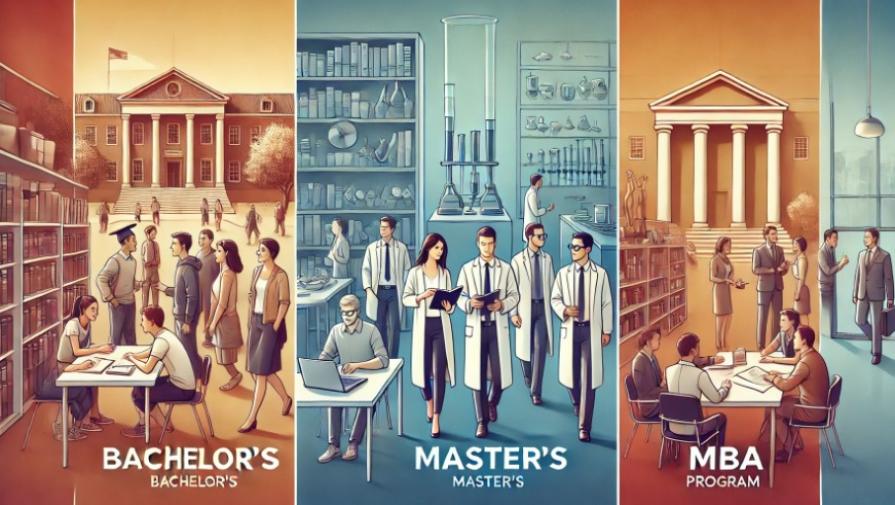If you have thought about studying abroad, you have almost certainly come across various abbreviations in various review articles (perhaps on our page) that hide the names of university programs in the USA, Great Britain, and the European Union. We're sure you almost certainly know what an MBA is, but here's the difference between BSN and BSc, 90% of our blog readers would find it hard to answer! Today we will try to understand these secret writings. Let's start in order.

What is an academic degree and what does the Bologna system have to do with it?
An academic degree is a qualification that a student receives after completing one of the stages of higher education. The most common option is a bachelor's degree, followed by masters and doctors of sciences, depending on the country in which the university is located. There are several other qualifications, which are often also called degrees — they reflect the specifics of the education systems of certain countries and most often (with a certain admission, and even then not always) fit into a three-level model of bachelor's, master's, and doctoral studies.
Previously, there were even more such national degrees, but by the mid-80s, the authorities of European countries began to think, and by the mid-noughties, they began to unify educational systems. The apotheosis was the conclusion in 1999 of the Bologna Agreement on the creation of the Single European Higher Education Area (EHEA). The Member States agreed to introduce a three-tier model of higher education, as well as a universal ECTS credit system, thanks to which a Bachelor's graduate (or holder of another first-level qualification) can easily enter the second stage of higher education in any Member State.
Now the Bologna system includes 48 countries, and most other countries de facto use similar three-level models, although somewhere there are additional qualifications that lie as if "on the side", they are quite difficult to correlate with the main levels of education. These are the associate degree in the United States, domestic graduates and the British Foundation degree.
Foundation and Pathway
Not a degree in the traditional view, but it helps to reach a level sufficient for admission to undergraduate programs. In general, a preparatory program that compensates for the insufficient number of years of study in a national school and is complemented by an academic and language component.
It is offered by many universities in the USA, Great Britain, the EU, Japan, the UAE, and most universities of the former British colonies. Studies last from six months to a year and a half, and graduates can enter a partner university, sometimes even without passing exams.
Along with the Foundation/Pathway Program, there is a Foundation degree: this is just an example of those very special degrees, they are offered only at universities in the United Kingdom and nowhere else.
Associate’s degree
This degree is most common in the United States, as well as in Hong Kong, some South Korean, Australian, Canadian, and Dutch universities. To get it, you need to study for two years. It is accepted by higher educational institutions in the United States, Canada, and less often by other countries.
Basically, an associate degree in the United States is awarded by community colleges, which main advantage over universities is cheapness; After graduating from such a college, you can usually transfer to the third year of university. Most often, programs are related to the social and natural sciences, art history, medical services (not medicine in general, but exclusively the field of medical services — to become a doctor or nurse, you need to study very long and difficult in the United States), as well as business.
Attending a community college also allows those who don't score well on the SAT or other exams to get into university. Moreover, they are accepted not from 17-18, but from 16 years old.
Associates are different: for example, there are Associate of Arts (A.A., a degree in the field of arts), of Science (A.S.), Applied Science (A.A.S.).
Bachelor’s degrees
We are used to the first stage of the three-level model Most often, when they say "I graduated from university", they are talking about bachelor's degrees, and master's and doctoral degrees are usually called post-graduate or postgraduate education.
In Europe, awarding degree depends on the number of academic hours, or equivalent to a certain number of credits — ECTS. Accordingly, for a bachelor's degree, you need to "earn" from 180 to 240 credits. Usually it takes from 3 to 4 years, although it can be done in a shorter time, and legal, medical and (sometimes) engineering, or architectural specialties require more thorough preparation, up to 5-6 years.
There are many bachelor's programs, so you can get confused and get lost in the countless abbreviations "with B" if you are not used to it. In general, they can be reduced to four main varieties:
- Bachelor of Arts, or BA,
- Bachelor of Science, or BSc,
- Bachelor of Engineering (BEng),
- Bachelor of Fine Arts, or BFe.
In some countries, there are only the first two degrees, in others the number of bachelor's degrees can reach 20 or even 30.
Master’s degrees
A Western master's degree is the second stage of the higher education. Abroad, those who intend to engage in scientific research or teaching all their lives often enroll in master's programs. Studying can last a year, as in the UK, or up to four years (this is how much they study in the United States in some programs).
The most popular and well-known master's degrees are the Master of Arts (MA), Master of Science (MSc) and, of course, the Master of Business Administration, i.e. MBA. Such education can hardly be considered necessary only for employees of international companies and large companies. The main point is not even in some secret knowledge, but in entering a narrow circle of recognized leaders of the business world and acquiring useful connections there.
Doctoral degrees
The main task of the future PhD is to write and defend a dissertation, so there is usually no traditional study with lectures and seminars here (the exception is some universities in Germany, Spain and Eastern European countries). Doctoral studies are often combined with teaching or working as an assistant; For this, doctoral students receive a salary, but it does not cover the cost of study (with rare exceptions).
It takes from 3 to 8 years to write a doctoral thesis if you are a foreigner; For their citizens in many countries, there are no restrictions on working on a doctoral dissertation, write at least until retirement (however, you will not be able to be an assistant forever - contracts are usually fixed-term).
Undergraduates and doctoral students are paid generous scholarships, they can count on educational or research grants, while a simple bachelor has to try hard for the sake of a scholarship — and even then it is not a fact that the amount will be enough to cover at least tuition, not to mention renting real estate and other aspects of life.








